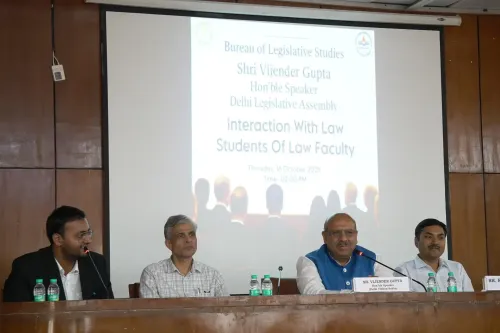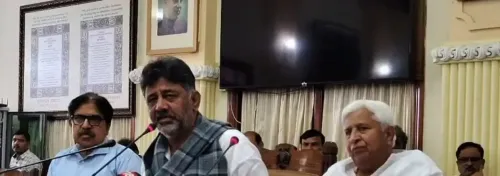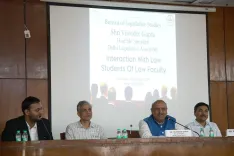Is India on Track to Achieve a ₹3 Lakh Crore Annual Military Hardware Target by 2029? - Rajnath Singh

Synopsis
Key Takeaways
- Target of ₹3 lakh crore for military hardware production by 2029.
- ₹50,000 crore expected from exports.
- Operation Sindoor showcases India’s indigenous capabilities.
- Significant increase in defence production over the last decade.
- Emphasis on the importance of skill development among youth.
Pune, Oct 16 (NationPress) Defence Minister Rajnath Singh announced on Thursday that the government aims to reach an impressive annual target of producing military hardware valued at ₹3 lakh crore domestically and ₹50,000 crore in exports by 2029, as part of a significant initiative towards self-sufficiency in the defence sector.
He emphasized that Operation Sindoor stands as a remarkable example of India’s growing indigenous capabilities, stemming from the government’s unwavering commitment to foster a self-reliant defence manufacturing landscape.
Rajnath Singh remarked that the journey towards self-reliance in defence faced challenges initially. However, under the leadership of Prime Minister Narendra Modi, relentless efforts were made to enhance domestic defence production, yielding fruitful results.
“We committed ourselves to transforming the defence sector. Historically, we relied heavily on imports for weapons. The political will to manufacture in India was lacking, and the necessary laws were absent. It was imperative to initiate change. Our goal is to produce indigenous weapons for our soldiers. The world witnessed the valor of our forces during Operation Sindoor, successfully achieving objectives with a significant amount of Made-in-India equipment,” he highlighted.
Recognizing the youth’s role in defence production, he noted that in the past decade, annual defence output has surged from ₹46,000 crore to an all-time high of ₹1.5 lakh crore, with around ₹33,000 crore contributed by the private sector. He expressed confidence in meeting the ₹3 lakh crore production and ₹50,000 crore export goals by 2029.
Rajnath Singh encouraged students to transcend academic success and become innovators and contributors to national growth, stressing that real achievement lies in applying knowledge for societal benefit.
He underscored the significance of skill development in shaping the future of India, stating: “We have moved past the era of ‘What do you know?’ to ‘What can you do?’ Knowledge without application is incomplete. Skill bridges the gap between learning and doing.”
Addressing concerns about technology, particularly Artificial Intelligence (AI), Rajnath Singh alleviated fears of job displacement, asserting that while AI will not replace humans, those who harness AI will outpace those who do not.
“Technology should serve as a tool, not as a replacement for human values, ethics, and sensitivity,” he concluded.









